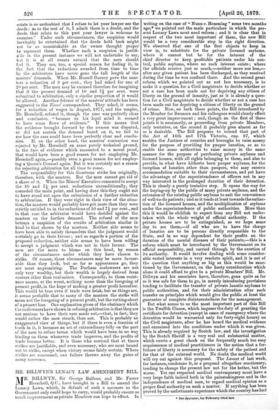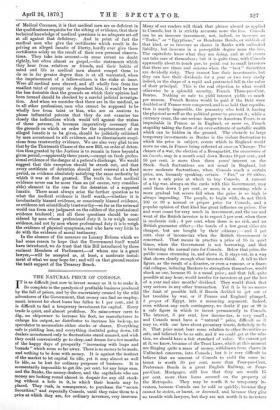MR. DILLWYN'S LUNACY LAW AMENDMENT BILL.
MR. DILLWYN, Sir George Balfour, and Mr. Farrer Herschel], Q.C., have brought in a Bill to amend the Lunacy Laws, which, in default of such a measure as the Government only could hope to carry, would probably ensure as much improvement as private Members can hope to effect. In writing on the case of " Nunn v. Hemming " some two months ago,* we pointed out the main particulars in which the pre- sent Lunacy Laws most need reform ; and it is clear that in respect of the two most important of these, the new Bill would be a very considerable step in the right direction. We observed that one of the first objects to keep in view is, to substitute for the private licensed asylums, where it cannot but be for the interest of the chief director to keep profitable patients under his con- trol, public asylums, where no such interest exists ; where the officials receive just as much,—neither more nor less,— after any given patient has been discharged, as they received during the time he was confined there. And the second great reform which we pointed out as not less necessary, is to make it a question for a Civil magistrate to decide whether or not a case has been made out for depriving any citizen of liberty on the ground of insanity, just as it is already a ques- tion for a Civil magistrate to decide whether or not a case has been made out for depriving a citizen of liberty on the ground of crime. Now, on both these points, the Bill introduced by the Member for Swansea and his colleagues would clearly effect a very great improvement ; and, though on the first of these points it is necessarily, as proceeding from private Members, only tentative, on the second it probably goes almost as far as is desirable. The Bill proposes to extend that part of the Act of 16th and 17th Victoria, cap. 97, which enables the Justices of counties and boroughs to raise money for the purpose of providing for pauper lunatics, so as to enable the same authorities to raise money in the same manner for the purpose of purchasing private asylums and licensed houses, with all rights belonging to them, and also to provide, in what have hitherto been pauper asylums, for the reception of lunatics other than paupers, who may receive accommodation suitable to their circumstances, and yet have the advantage of the superintendence of officers not in any way interested in the prolonged duration of their detention. This is clearly a purely tentative step. It opens the way for the buying-up by the public of many private asylums, and the extension of the existing public asylums to suit the convenience of well-to-do patients ; and so it tends at least towards the extinc- tion of the licensed houses, and the multiplication of asylums under the superintendence of public authorities. More than this it would be childish to expect from any Bill not under- taken with the whole weight of official authority. If the private houses are to be extinguished, as we hope some day to see them,—if all who are to have the charge of lunatics are to be persons directly responsible to the State, and in no way dependent for their profits on the duration of the mental diseases of their patients,—this is a reform which must be introduced by the Government on its official responsibility, and carried through by the exertion of its authority. It would involve dealing with some consider- able vested interests in a very resolute spirit, and it is out of the question that anything so big as this would be sanc- tioned by the Government, on the hasty consideration which alone it could afford to give to a private Members' Bill. Mr. Dillwyn and his associates have, therefore, gone quite as far as it was safe for them to go, in merely introducing provisions tending to facilitate the transfer of private lunatic asylums to public authorities, and for their administration after such transfer on principles which would give the public at least the guarantee of complete disinterestedness for the management.
But what seems to us the most important part of this Bill is the Twelfth Clause, which imposes the duty of granting the certificate for detention (except in cases of emergency where the detention would be warranted only for forty-eight hours) on the Civil magistrate, after he has heard the medical evidence and examined into the conditions under which it was given. This is already required by Scotch law, and the investigation by the Scotch Sheriff is a very real and substantial matter, which exerts a great check on the frequently much too easy acquiescence of medical practitioners in the notion that a for- feiture of liberty is necessary for the safety of the patient and for that of the external world. No doubt the medical world will cry out against this proposal. The Lancet of last week, for instance, condemns it, as a proposal altogether reactionary, tending to change the present law not for the better, but the worse. Yet our respected medical contemporary must have a very large faith indeed both in the painstakingness and in the independence of medical men, to' regard medical opinion as a proper final authority on such a matter. If anything has been proved by the unfortunate experience which the country has had • See Spectator, for February 22nd Lat.
of Medical Coroners, it is that medical men are so deficient in the qualifications requisite for the sifting of evidence, that their technical knowledge of medical questions is no adequate set-off at all against that deficiency. And in point of fact the medical men who give the certificates which result in de- priving an alleged lunatic of liberty, hardly ever give these certificates solely on the result of their own personal observa- tions. They take into account—to some extent no doubt rightly, but often almost as gospel,—the statements which they hear from relatives or friends, and their habits of mind and life as medical men almost compel them to do so in far greater degree than is at all warranted, when the imprisonment of a fellow-citizen is the stake at issue. Were all medical men shrewd, and all wholly free from the smallest taint of corrupt or dependent bias, it would be none the less desirable that the grounds on which their opinion had been formed should be checked by a careful judicial investiga- tion. And when we consider that there are in the medical, as in all other professions, men who cannot be supposed to be wholly free from taint or bias, who are so anxious to please influential patrons that they do not examine too closely the indications which would tell against the wishes of those patrons, it becomes imperatively necessary that the grounds on which an order for the imprisonment of an alleged lunatic is to be given, should be judicially criticised by men accustomed to sift evidence, and to discriminate suspi- cious from trustworthy evidence. We are also very glad to see that by the Thirteenth Clause of the new Bill, no order of deten- tion thus granted by the Justices is to remain in force beyond a given period,—apparently three years,—except on fresh profes- sional evidence of the danger of a patient's discharge. We would suggest that this exception should be struck out, and that every certificate of detention should need renewal at a fixed period, on evidence absolutely satisfying the same authority by which it was at first granted. The truth is, that medical evidence never can be more than an (of course, very consider- able) element in the case for the detention of a supposed lunatic. There must always arise the further question as to what the medical evidence is itself worth,—whether it is involuntarily biassed evidence, or consciously biassed evidence, or evidence not scientifically trustworthy—so far as the external world can form any judgment on the calibre of the professional evidence tendered ; and all these questions should be con- sidered by men whose professional duty it is to weigh moral evidence, and not by men whose professional duty it is to weigh the evidence of physical symptoms, and who have very little to do with the evidence of moral testimony.
In the absence of the measure on Lunacy Reform which we had some reason to hope that the Government itself would have introduced, we do trust that this Bill introduced by three eminent Members of Parliament,—of whom one is a great lawyer,—will be accepted as, at least, a moderate instal- ment of what we may hope for; and will on that ground receive the tacit support of the Treasury Bench.



































 Previous page
Previous page